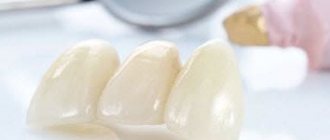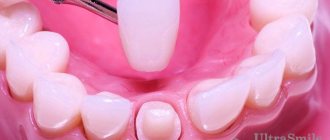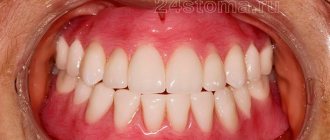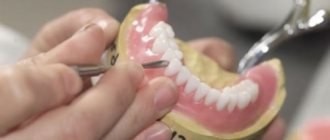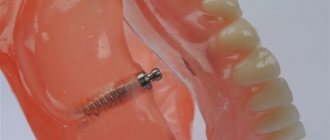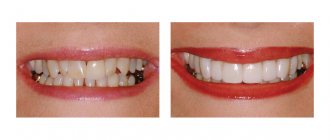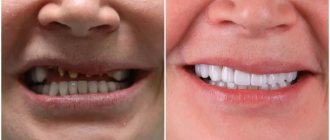From this article you will learn:
- what types of dentures are there?
- pros and cons of different removable dentures,
- New generation removable dentures without palate – price 2021.
Removable dentures mean those dentures that the patient can take off and put on himself. As a rule, they are made only when there are a large number of missing teeth - in cases where there is no possibility of permanent prosthetics with bridges or through dental implants.
In addition to traditional types of removable dentures, in recent years conditionally removable dentures on implants, as well as new generation removable dentures without a palate, have been gaining popularity. Below you can learn about the advantages and disadvantages of both traditional and modern types of dentures.
Plastic crowns
Installing plastic dental crowns is the most economical and efficient method of prosthetics. Their production occurs very quickly, so the patient can receive ready-to-use products in just one visit to a specialist. However, false teeth made of plastic are much more fragile and short-lived compared to their counterparts made of metal-ceramics or metal. In this regard, in most cases, such products are used as a temporary solution while more reliable crowns are made from other materials.
Reviews
— Albert
I really liked the level of service and attitude of the staff.
- Eugene
They saved me, there’s no other way to put it. Thank you for the speed and decency. Everything as promised!! I recommend to all!!!
- Svetlana
This is not the first time we have used denture repair services. As always FAST AND HIGH QUALITY! Thank you for your promptness and understanding!!
— Ksenia Vladimirovna
My daughter’s denture broke on the eve of her wedding, I was very upset, but Denta-Labor managed to fix it very quickly and efficiently, thank you.
Advantages and disadvantages
Like all materials used in dentistry, plastic has certain advantages and disadvantages.
Advantages:
- Efficiency of production without the use of expensive specialized equipment.
- Availability for various categories of patients.
- Attractive appearance.
- The minimal weight of the material allows it to be used in cases where it is necessary to protect the jaw tissue from serious pressure from artificial teeth.
Flaws:
- Products are contraindicated for people who are prone to allergies to artificial polymers.
- Short service life (approximately 24 months).
- Rapid loss of original appearance (shade changes under the influence of various food colorings).
- High probability of chips and cracks.
- The porous structure provides poor hygiene characteristics (accumulation of microscopic food particles and various bacteria).
- The need to prepare a significant amount of dental tissue due to the impressive thickness of the crown.
Delivery areas:
- Altufyevo
- Bibirevo
- Biryulyovo East
- Central Administrative District
- Chertanovo
- Golyanovo
- Krasnopresnenskaya
- Kuntsevo
- Kuzminki
- Odintsovo
- Lyublino
- Medvedkovo
- Mitino
- Otradnoe
- Pavshinskaya floodplain
- Printers
- Polezhaevskaya
- River Station
- Ryazan Avenue
- SAO
- Northern Butovo
- Sokolniki
- NEAD
- SZAO
- Tushino
- Southern Administrative District
- SEAD
- South-Western Administrative District
- Voikovskaya
- Vykhino
- Company
- Zhulebino
- Aprelevka
- Dubki
- Krasnoznamensk
- Krylatskoe
- Cuban
- Nazaryevo
- Barvikha
- Vlasikha
- VNIISSOK
- Vnukovo
- Larks
Indications and contraindications
Plastic crowns are indicated in the following cases:
- the need to use a temporary structure during the production of a permanent prosthesis;
- aesthetic function when changing the shape or shade of teeth in the smile area;
- a permanent solution for restoring the basic functions of dental elements in case of congenital pathologies, damage and caries.
Contraindications to the installation of plastic structures are:
- childhood;
- deep bite;
- presence of allergies to the material;
- bruxism (teeth grinding).
Production stages
The production of plastic crowns takes place directly in the dental office and includes several stages.
- Preparation of the oral cavity for installation of a prosthesis and preparation of teeth.
- Obtaining impressions of the dentition using mouth guards with a special composition.
- Making a plaster model of dental elements.
- Formation of a crown on a model from a plastic mass pre-selected taking into account the natural color of the patient’s tooth enamel, followed by grinding and polishing of the product.
- Trying on and eliminating minor flaws.
- Final installation using temporary composites.
Installation method
Before performing prosthetics, the oral cavity is sanitized. After the impression is taken, the model is sent to the laboratory for further work. The dentist grinds down the teeth on which the product will be placed.
After prosthetics, aesthetics are restored
Interesting! Depulpation is carried out - the pulp and nerves are removed, all canals are filled.
The next stage is fitting. If there are minor defects, they will be corrected mechanically - by grinding and so on. The product is fixed only after the doctor understands that it is completely suitable and the patient does not experience discomfort. Cement is used for fixation.
Metal-plastic crowns - key features
Metal-plastic products are metal crowns, the shell of which is made of plastic. The combination of materials makes the structure more durable and at the same time light and attractive.
Due to the minimal weight of metal-plastic crowns, they can be used in cases where for a certain time it is necessary to mask a lack of dentition and protect the jaw tissue from significant pressure.
In most cases, metal-plastic structures are used as a temporary solution when choosing prosthetics with implants. Such products can be quickly manufactured, they look attractive, are securely fixed and do not exert significant pressure on the implant.
Specialists also use metal-plastic pin crowns according to Richmond. This is a suitable option if there is a healthy root, but loss of dense tooth tissue. A metal ring is installed around the root neck, to which a plate with a special hole is attached for further installation of the pin. The pin is needed not only to fix the outer part of the crown, but also to protect the root canal from food particles and saliva. Crowns are made exclusively from high quality plastic, for example, from the Japanese manufacturer Yamahachi.
Porcelain vs plastic crowns
Porcelain designs also have advantages and disadvantages. It is necessary to select a specific material taking into account the individual characteristics of each patient. Thus, porcelain products are more reliable and perform their functions longer. But they have a negative impact on the condition of the teeth located on the opposite jaw, and also have a higher price.
Plastic products are inexpensive, quickly manufactured and do not affect the condition of the enamel of antagonist teeth. However, their disadvantages include a shorter service life and a higher likelihood of chipping and damage. Externally, plastic crowns do not differ from porcelain ones.
What is the price
The price depends on the amount of work and its complexity, but the RUTT clinic does everything to reduce the financial burden. The center offers the opportunity to pay for prosthetics in installments and take out a loan. You will be given documents for a tax deduction, and by subscribing to the newsletter, you will know about all promotions and discounts. Sign up on the website and get professional advice for free.
Free online consultation with a dentist
| Service | Price |
| Installation of a temporary cosmetic plate (butterfly) | from 11,000 rub. |
| Installation of a complete or partially removable lamellar denture (acrylic, 1 jaw) | from 32,000 rub. |
| Conditionally removable acrylic prosthesis on spherical attachments Rhein-83 for 1 jaw | from 121,000 rub. |
Consultation and diagnostics are free!
All prices Promotions
Plastic dentures
The structures are made from acrylic plastic and are used in cases of loss of one tooth or all elements of the dentition. Dentures of this type look very natural, since a shade is used for the base and teeth itself that perfectly matches natural tissues. In the case of complete edentia, plastic dentures rest only on the gingival tissue. Their fixation in the oral cavity occurs through a “closing valve” - a vacuum between the mucous membrane and the prosthesis. If several elements of the dentition are being restored, clasps (metal wires) are used to securely fasten the prosthesis. When replacing one tooth with prosthetics, butterfly prostheses are usually used, the attachment of which to the gum is carried out with special plastic extensions.
Cost of prosthetics
The cost of partial removable dentures depends on the type of design chosen, materials of manufacture, and the number of units restored. Prices are also influenced by factors such as the condition of the oral cavity, the need for preliminary treatment and prescribed diagnostic measures. On average, prosthetics start from 20 thousand rubles, but the doctor will be able to name the exact cost only after an initial examination and research. Prices for prosthetics can be found below.
| Name | Price from |
| Consultation with a specialist (included in the manufacturing cost when ordering a prosthesis) | 500 rub. |
| Cost of partially removable dentures | 30,000 rub. |
For additional information on prosthetics using partial removable dentures, leave a request on the website or call +7 . Denta-Labor specialists will answer all your questions and make an appointment for you at the most convenient time.
Dyatlov Evgeniy Valerievich
Head of the Denta-Labor laboratory and teacher at the training center organized at the laboratory.
Graduated from Stavropol Basic Medical College.
Author of the article: Scientific team of the dental laboratory Denta-Labor
- Studied in Germany with Dr. Karl Peter Meschke in the course of complete removable prosthetics.
- I attended a course of lectures at the German Dental Academy based at BEGO (Bremen).
- Completed a week-long internship in Germany at the BEGO company on new technologies and materials for removable prosthetics.
Types of prostheses
Prostheses made of acrylic plastic are distinguished depending on the manufacturing technology:
- Pressed - are easy to make, but are not particularly convenient and highly detailed.
- Casting ones are more convenient to use, since a more precise manufacturing method is used, and their appearance completely corresponds to natural teeth.
Prostheses also differ in the ability to remove them by the patient himself:
- Removable - a person can remove the denture from the mouth for cleaning without the help of a specialist.
- Fixed - these dentures do not need to be removed to perform hygiene measures.
Where to put
In Moscow, placing a removable acrylic denture on the jaw is not difficult. But making a system in a tiny laboratory is one thing, but making it in a modern one, equipped with the latest technology, is quite another. Shrinkage of acrylic plastics can reach 6-8% and only careful adherence to technology can reduce it to a minimum. A well-equipped laboratory is suitable for this, but a small one is not. Shrinkage determines how accurately the prosthesis “fits” on the jaw.
MCDI ROOTT has its own laboratory, orthodontists and laboratory assistants work in one team. New equipment and experienced doctors guarantee the quality of prostheses.
Advantages and disadvantages
Acrylic dentures are in great demand due to the following advantages:
- low price compared to products made from other materials;
- high strength indicators and service life up to 8 years;
- the ability to manufacture products of different levels of complexity and shapes with the choice of the optimal shade;
- minimal weight, accelerating the process of addiction;
- no pressure on the supporting elements of the dentition, ensuring the preservation of natural tooth enamel in good condition;
- lightness and ease of care, thanks to which patients can remove and install the structure back without the help of a doctor.
However, there are some disadvantages:
- risk of soft tissue injury in the area of contact with the prosthesis;
- frequent allergies to plastic;
- the likelihood of damage to tooth enamel and further destruction of a completely healthy tooth if metal clasps are used;
- the porous structure of the material absorbs odors, food dyes and pathogens.
Advantages of the Denta-Labor team
- Many years of experience More than 20 years in the dental services market
- Modern equipment Expert class dental devices
- Denta-Labor's own training center conducts training courses for dental technicians in Moscow
- Individual approach The client’s wishes and existing orthopedic problem are taken into account
- No unnecessary additional services Completion of work according to a pre-agreed estimate
- Courier delivery We will deliver the dentures as soon as possible
Indications and contraindications
Experts highlight the following indications:
- A temporary solution while a permanent structure is being produced from more durable materials.
- A permanent solution for the loss of one or more elements of the dentition, including complete absence of teeth.
Contraindications:
- the presence of acute inflammation of the oral mucosa in the area of intended contact with the prosthesis;
- the presence of epilepsy or mental disorders;
- allergies to synthetic polymers;
- poor care of existing dental elements in the oral cavity.
Additional questions for your doctor
Whitening dentures
Is it possible to somehow whiten dentures made of plastic?
After the prosthesis is installed, the patient will be given recommendations on how to care for it. Most often these are familiar hygiene procedures.
However, such methods will only slow down the darkening process; in addition, special pastes should be used. The oral cavity can be periodically rinsed with medicinal plants, thus the development of the inflammatory process can be avoided.
Darkening of the structure
Can plastic teeth darken?
Despite the fact that the surface is thoroughly polished, some roughness may remain. Thus, various deposits, food particles, etc. can linger and accumulate. Over time, plaque will form, the dentures will begin to darken, and the original appearance will be lost.
Hygiene
To ensure the longest service life of an acrylic plastic denture, it must be properly cared for by removing plaque and food residues with a soft toothbrush in the morning and evening.
Removable dentures must be disinfected once every 24 hours with a special solution to remove dirt and various microorganisms. If the denture is not removable, it is important to carefully clean the space between the teeth and the areas of contact between the structure and natural tissues. A toothbrush, pipe cleaners and floss will help with this.
At least once a year it is necessary to contact a specialist for the purpose of minimal restoration or relining of the plastic prosthesis. Relining is the correction of the shape of a structure from the inside, as a result of which the load on the tissue is distributed differently. This prevents too early atrophy and tissue damage.
When choosing plastic dentures and crowns, it is important to take into account all the advantages and disadvantages of such products. It is recommended to take into account the advice of professionals who will help you choose the best option for prosthetics.


